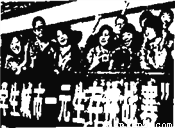题目内容
阅读下面短文,然后根据括号内所给汉语意思写出单词的正确形式。每空限填一词
Have you ever heard of "National Smile Month"? It started on the 14th of1.(五月) in the UK. During this month, people are made to think about the importance of brushing their teeth, 2. (吃)less sweet foods and going to see the 3. (医生)from time to time.
The British are4.(出名的) for their bad teeth. Even a dictionary has the expression“ British Smile”, meaning“ Any smile with bad teeth".5.(然而), in America,the“ Holly wood Smile” gets its name because American movie6.(明星)are so proud to show off their beautiful teeth.
But what about smiling in the UK? Do the British smile a lot, or do they look 7.(悲伤的)all the time? It's said that the British don't often show their feelings. But actually it all 8. (取决于) on the situation. For example, Britain doesn’t 9. (允许) smiling in passport photos. But if you are at a party, you'Il find everyone smiling 10.(开心地) and loudly.
So, the British smile as much as anyone else.
1.May 2.eating/having 3.doctor/doctors 4.well—known 5.However 6.stars 7.sad 8.depends 9.allow 10.happily 【解析】短文介绍了英国所设立的“国家微笑月”,旨在唤起人们对保护牙齿的重视程度。在这个月,人们开始思考刷牙,少吃甜食,经常去看医生...Teenagers are known for being creative and full of new ideas. Let’s have a look at these teenage inventions that might change the world.
Banana leaves usually go bad in two or three days. Tenith Adithyaa, a teenager from India, used UV to make the leaves stay fresh for a year. Tenith thinks that one day the leaves will be used for making plates, cups and other things. |
David Cohen, an American teenager, built an earthworm(蚯蚓) robot. It is able to go into the smallest places, where humans or dogs can’t go. It will be used for finding people in a fire or an earthquake. |
Remya Jose, a 14-year-old from India, found it tiring and boring to handwash clothes in the nearby river. She reused some bicycle parts and created a washing machine that saves time, energy and keeps people fit at the same time. |
Kenneth Shinozuku, a 15-year-old from New York, noticed that his grandfather who got Alzheimer's disease(老年痴呆) would often leave home and get lost. So he invented the wearable sensors(感应器)to help people find their family members like his grandfather. |
1.What is the passage mainly about?
A. Popular ads
B. Useful machines
C. Strange pictures.
D. Teenage inventions
2.The earthworm robot by David Cohen can ______.
A. make things stay fresh
B. help people wash clothes
C. go into the smallest places
D. take care of the old people
3.Which of the following is TRUE
A. Plates and cups are made of fresh banana leaves.
B. Remya's washing machine can also keep people fit.
C. David Cohen is a middle school student from India.
D. Kenneth's wearable sensors will keep old people at home.
1.D 2.C 3.B 【解析】短文展示了青少年的4项发明创造。如何使树叶保鲜;蚯蚓机器人;自行车部件改装的洗衣机;可穿戴的传感器。 1.主旨大意题。根据表格前面的句子“Let’s have a look at these teenage inventions that might change the world.” 让我们来看看这些可能改变世界的青少年的发明。可知短文展...






